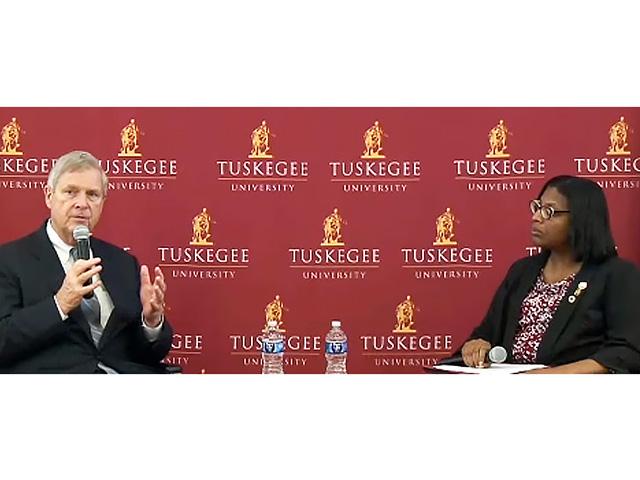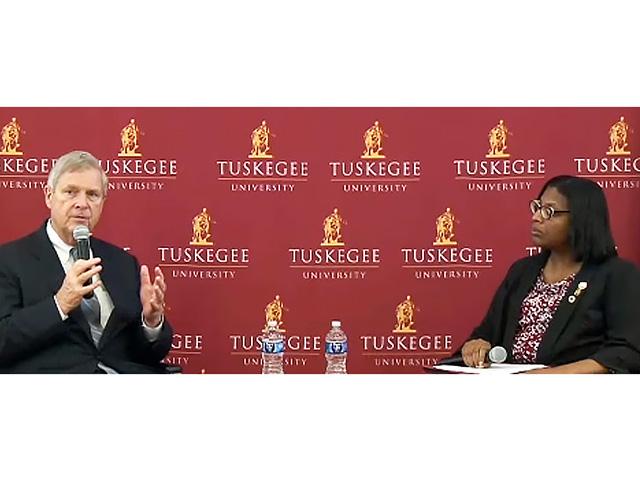Ag Policy Blog
Vilsack Announces Climate-Smart Grants for Small, Underserved Farmers
WASHINGTON (DTN) -- At an event at Tuskegee University in Alabama on Monday, Agriculture Secretary Tom Vilsack announced $325 million for 71 projects under the second funding pool of the Partnerships for Climate-Smart Commodities effort.
The goal of the partnership program is to expand markets for American farmers, ranchers and foresters who produce climate-smart commodities, leverage greenhouse gas benefits of climate-smart production, and provide meaningful benefits to producers, including small and underserved producers.
The $325 million announced today is in addition to the $2.8 billion in 70 larger projects announced earlier, bringing the total investment from both funding pools to over $3.1 billion for 141 tentatively selected projects in the Partnerships for Climate-Smart Commodities program.
Funding for the projects comes from the Commodity Credit Corporation, USDA's line of credit at the Treasury Department. The decision to use money from the CCC account is controversial with Republicans who question whether the climate-smart projects are an appropriate use of CCC funds.
See, "Incoming House Ag Committee Chair Lays Out Farm Bill, Ag Supply Chain Priorities," https://www.dtnpf.com/…
Farmers, ranchers and foresters throughout the country understand the risks of a changing climate and recognize it hurts small farmers and those historically underserved "a bit harder," Vilsack said in making the announcement.
USDA, he added, has "a responsibility to reach out to small sized operations so they know they can participate in an opportunity USDA is providing."
"Small and underserved producers are facing the impacts of climate change head on, with limited resources, and have the most to gain from leveraging the growing market demand for agricultural goods produced in a sustainable, climate-smart way," Vilsack said in a news release. "Our goal is to expand markets for climate-smart commodities and ensure that small and underserved producers reap the benefits of these market opportunities."
Talking about projects that will work on sustainable aviation fuels, Vilsack recalled a conversation a couple weeks ago with the President of United Airlines who was pushing for such fuels to help airlines reduce their emissions.
"America needs an opportunity to create leadership in a lower carbon-based fuel," Vilsack said.
The Partnerships for Climate-Smart Commodities funding opportunity had high demand from across agriculture and forestry. Between two funding pools, USDA received over 1,000 proposals requesting more than $20 billion in funds from more than 700 entities, including nonprofit organizations; for-profits and government entities; farmer cooperatives; conservation, energy and environmental groups; state, tribal and local governments; universities; small businesses; and large corporations.
P[L1] D[0x0] M[300x250] OOP[F] ADUNIT[] T[]
Applications were received from all 50 states, tribal lands, Washington, D.C., and Puerto Rico.
Vilsack made the announcement in a program with Olga Bolden-Tiller, the dean of the Tuskegee College of Agriculture, Environment and Nutrition Science and 1890 research director at Tuskegee University.
Vilsack noted that Tuskegee, a historically Black college and university and 1890 Land-grant University, had already qualified for grants under the larger climate-smart initiative, and is the lead partner on two smaller projects: one focused on developing climate-smart markets for agroforestry products and providing underserved producers assistance in transforming traditional production systems into agroforestry-based climate-smart production systems, and the other working with underserved producers to implement silvopasture and climate-resilient forage systems and market climate-smart sheep and goat products.
USDA also awarded a grant titled "Recognizing the Role of Buffalo Production as a Climate-Smart Commodity" project to the InterTribal Buffalo Council and other partners plan to work with 76 Tribes to incentivize their use of climate-smart practices related to buffalo herds.
The Tribal Buffalo Market Initiative plans to assist Tribes in marketing their buffalo as a climate-smart commodity, develop sustainable programs for historically underserved Tribal buffalo producers and create a Tribally-led national strategy for education and outreach of buffalo as a climate-smart agricultural product.
Troy Heinert, a Sicangu Lakota who is executive director of the InterTribal Buffalo Council, appeared at the event by video.
Engil Pereira, assistant professor in the School of Earth, Environmental and Marine Sciences at the University of Texas Rio Grande Valley.
The University of Texas Rio Grande Valley and its partners will get a grant titled "Validating Agrivoltaic Technology with Underserved Agricultural Producers" project. Periera said the project will test the use of solar power for farmers with fewer than 50 acres in production.
They will pilot the climate-smart co-location of agriculture and solar power (agrivoltaics) to measure and evaluate greenhouse gas benefits and promote equitable climate-smart commodity market development for Hispanic farmers and ranchers. Partners also intend to provide direct financial and culturally relevant technical assistance to participants for implementing agrivoltaic systems on their farms and ranches.
Vilsack emphasized that all the projects will be evaluated and repeated previous statements that the climate-smart projects are an opportunity for American agriculture to lead in the world in climate-smart projects and generate new income sources and income for farmers, ranchers and foresters.
Video, USDA Investments in Climate-Smart Commodities https://www.youtube.com/…
Partnership for Climate Smart Commodities
DTN is part of one of the earlier climate-smart projects funded by USDA, "Farmers for Soil Health Climate-Smart Commodities Partnership," which will receive up to $95 million to "accelerate long-term cover crop adoption" by creating a platform to "quantify, verify, and facilitate the sale of ecosystem benefits, creating a marketplace to generate demand for climate-smart commodities." The partnership will involve farmers in at least 19 states who grow corn and soybeans. The National Corn Growers, United Soybean Board, National Pork Board, National Center for Appropriate Technology, National Association of Conservation Districts, Soil Health Institute, University of Missouri, Sustainability Consortium, DTN and The Walton Family Foundation are involved. The project is led by the National Fish & Wildlife Foundation.
Also see,
"Citing Demand, USDA More Than Triples Funds for Climate-Smart Pilot Program,"
DTN Ag Policy Editor Chris Clayton contributed to this report.
Jerry Hagstrom can be reached at jhagstrom@nationaljournal.com
Follow him on Twitter @hagstromreport
(c) Copyright 2022 DTN, LLC. All rights reserved.






Comments
To comment, please Log In or Join our Community .